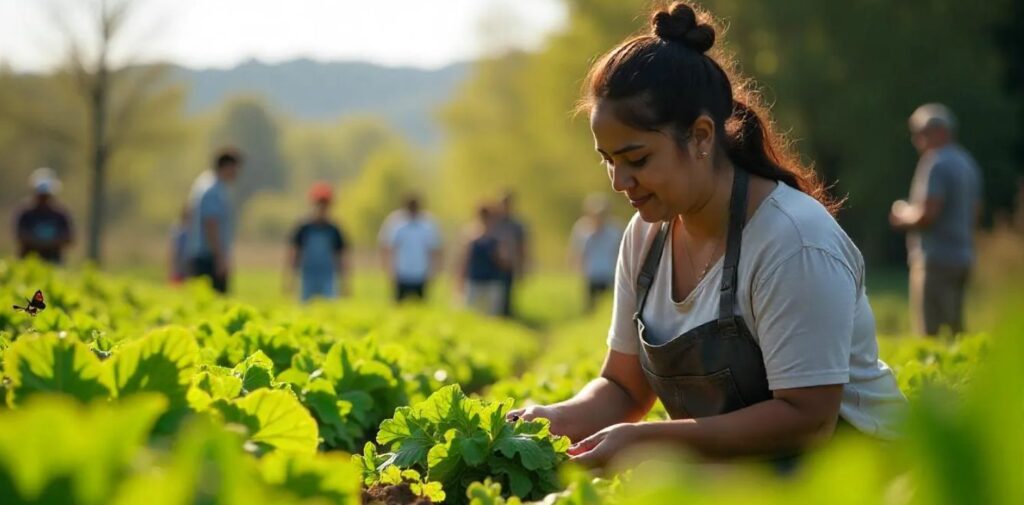India is home to a large rural population, and the development of rural areas is essential for the overall progress of the nation. In these rural regions, women play a pivotal role in driving change and improving the living standards of their communities. Historically, women in rural India have been seen primarily as homemakers, but over the years, their role has expanded beyond traditional boundaries. Today, women are at the forefront of agricultural development, social reforms, and economic growth in rural India. Their contributions have proven to be indispensable in fostering sustainable development and empowering their communities. This article explores the Role of Women in India Rural Development and the transformative impact of their involvement.
Women as Pillars of Agriculture
Agriculture remains the backbone of India’s rural economy, with a significant portion of the rural population depending on farming for their livelihoods. Women in rural India are heavily involved in agriculture, often working alongside their male counterparts. They engage in a variety of tasks, from planting crops and harvesting to managing livestock and working in the fields. In fact, studies show that women contribute to over 60% of the agricultural labor force in rural India.
While men typically control land ownership, women often contribute their labor in cultivating crops, processing food, and managing small-scale agricultural activities like dairy farming and poultry. Their involvement is not just limited to physical labor but extends to making important decisions related to crop selection, seed preservation, and farm management.
However, the work done by women in agriculture is often invisible and undervalued. Despite their significant contributions, women in rural India face challenges such as limited access to land rights, resources, and decision-making power. To address these issues, there have been initiatives to empower rural women with knowledge about sustainable farming practices, organic agriculture, and financial management. When women are given access to these resources and training, they can drive productivity and ensure better economic outcomes for their families and communities.

Women as Catalysts for Social Change
Women in rural India have become powerful agents of social change. In many rural areas, women have led the way in community mobilization, advocating for better healthcare, education, and social services. These women are not only transforming their own lives but also influencing the overall development of their communities.
One of the key areas where rural women have been effective is in promoting literacy and education. In rural India, where access to quality education can be limited, women have often taken the initiative to educate their children, particularly their daughters. This focus on education is changing the social dynamics, as more and more rural girls are attending school and pursuing higher education.
Women are also actively involved in health and sanitation initiatives. In several rural areas, women have led the charge in improving hygiene standards, raising awareness about sanitation practices, and ensuring access to clean drinking water. Women-run self-help groups (SHGs) often organize health camps and awareness programs, providing critical services in underserved areas. Their efforts have had a measurable impact on reducing maternal and child mortality rates and promoting better overall health in rural communities.
Women’s Economic Empowerment and Entrepreneurship
Economic empowerment of women is a key factor in the development of rural India. Women in rural areas have traditionally been excluded from formal economic systems due to limited access to education, training, and financial resources. However, in recent years, there has been a concerted effort to bring women into the formal economy by providing them with opportunities for entrepreneurship and self-employment.
Self-help groups (SHGs) have been one of the most successful initiatives in empowering rural women economically. SHGs are small, community-based groups of women who come together to save money, provide loans to members, and engage in income-generating activities. These groups often start small businesses, such as making handicrafts, producing food items, or running small retail stores. The financial independence gained through SHGs not only helps women support their families but also boosts the local economy.
In addition to SHGs, government schemes like Mahatma Gandhi National Rural Employment Guarantee Act (MGNREGA) have provided rural women with employment opportunities, helping them earn wages and gain financial independence. Women working under MGNREGA often engage in public works like road construction, irrigation projects, and water conservation, which directly contribute to rural development. These initiatives also enable women to break free from traditional gender roles and contribute to the broader development agenda.

Women’s Participation in Governance and Leadership
Women in rural India are increasingly participating in governance and leadership roles, both at the grassroots and higher levels. The 73rd and 74th Amendments to the Indian Constitution, which mandate a certain percentage of seats for women in Panchayats (local government bodies), have opened doors for women to engage in decision-making processes. These reforms have led to a dramatic increase in women’s representation in local governance.
Women leaders in Panchayats have played a crucial role in addressing issues like poverty, access to education, healthcare, and clean drinking water. Their involvement in governance has brought a more inclusive and holistic approach to development, with a greater emphasis on social welfare and community needs. Many women leaders have worked towards improving infrastructure, promoting agricultural reforms, and ensuring access to government schemes for the underprivileged.
Moreover, women leaders in rural India have helped break down societal barriers and challenge traditional norms. By holding positions of power, women are changing the perception of what is possible for women in rural areas. This shift is inspiring younger generations of girls to aspire for leadership roles, further strengthening the development of rural communities.
Women’s Role in Sustainable Development
Sustainable development is at the heart of India’s rural development goals, and women are increasingly seen as key players in achieving sustainability. In rural areas, women have been at the forefront of efforts to protect the environment, conserve natural resources, and promote sustainable agricultural practices. Many women are involved in organic farming, water conservation projects, and the promotion of renewable energy sources like solar power.
Women’s involvement in water conservation has been particularly impactful. In several drought-prone areas, women have led efforts to harvest rainwater, manage water resources, and ensure that water is used efficiently in agriculture. By adopting eco-friendly practices, women are not only improving their own lives but are also contributing to the long-term sustainability of their communities.

The Challenges Women Still Face in Rural Development
Despite the significant progress made by women in rural development, there are still several challenges that need to be addressed. One of the primary issues is gender inequality, which remains deeply ingrained in many rural communities. Women continue to face barriers such as limited access to education, healthcare, and financial resources. Patriarchal norms often restrict women’s mobility and participation in public life, hindering their ability to fully contribute to development.
Additionally, women in rural areas are often burdened with household chores and caregiving responsibilities, leaving them with little time to engage in economic or social activities outside the home. To truly empower rural women, it is essential to address these gendered divisions of labor and provide women with the support they need to participate in broader development activities.
Conclusion: Role of Women in India Rural Development
Women in rural India are driving change and shaping the future of their communities in profound ways. Whether through their work in agriculture, education, healthcare, entrepreneurship, or governance, women are making valuable contributions to the development of rural areas. Their involvement is not only empowering them but also transforming the social and economic fabric of rural India. While challenges remain, the progress made so far demonstrates that when women are given the opportunity, they can play a transformative role in shaping a brighter future for rural India. Empowering women in rural areas is not just about improving their lives; it is about improving the lives of entire communities and ensuring that rural development is inclusive, sustainable, and equitable.




